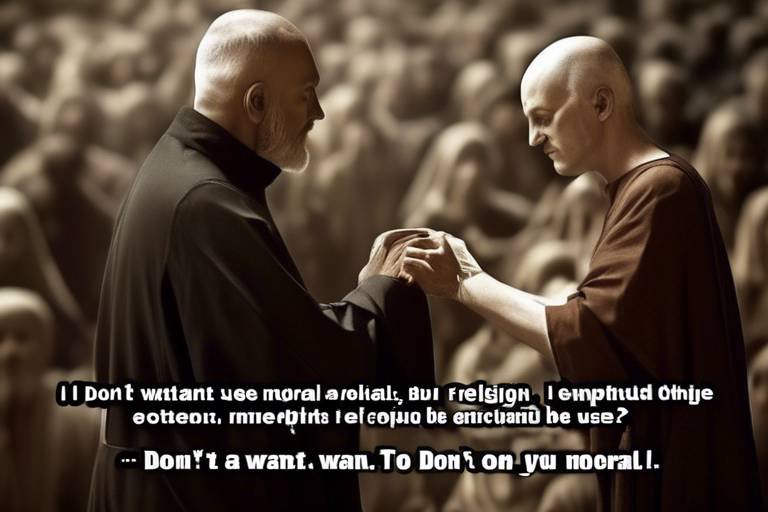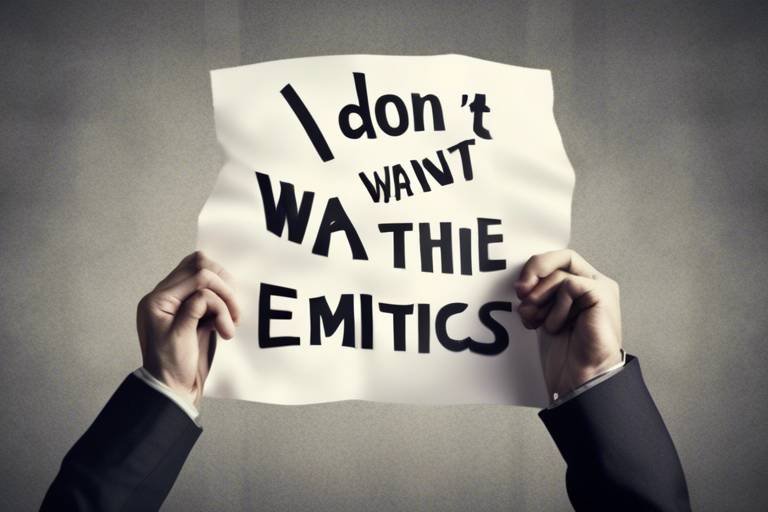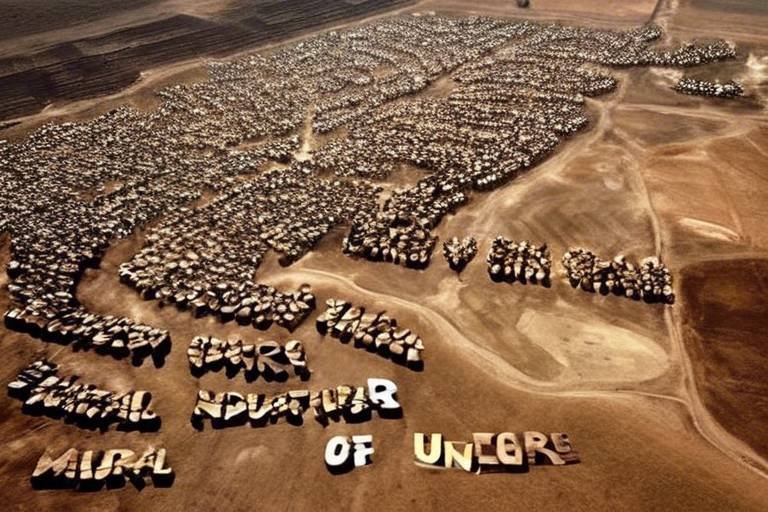Can One Be Moral Without Religion?
Throughout history, the question of whether morality can exist independently of religion has stirred debates among philosophers, theologians, and everyday people alike. Many argue that without a divine authority to dictate right and wrong, individuals would be lost in a sea of moral relativism. However, this perspective overlooks the rich tapestry of secular moral frameworks that have emerged over centuries, demonstrating that ethical principles can thrive outside the confines of religious doctrine.
To begin with, morality can be understood as a set of principles that guide our behavior in society. These principles are often shaped by cultural norms, personal experiences, and a shared understanding of what constitutes harm or benefit to others. In fact, many secular moral systems emphasize reason, empathy, and human experience as the cornerstones of ethical decision-making. This raises an intriguing question: if we can establish moral guidelines based on our shared humanity, do we really need religion to be moral?
Consider the concept of empathy, which plays a pivotal role in our moral reasoning. When we feel empathy for others, we are compelled to act in ways that alleviate suffering and promote well-being. This innate capacity for empathy can guide our actions just as effectively as any religious edict. For instance, when witnessing someone in distress, our instinctual response is often to help, regardless of our religious beliefs. This suggests that moral behavior is deeply rooted in our human nature, rather than solely in religious teachings.
Moreover, history provides numerous examples of cultures that have developed robust moral frameworks without relying on religious doctrines. Ancient philosophers such as Socrates and Confucius explored ethical questions and proposed moral systems based on reason and human experience. Their teachings have influenced countless generations, emphasizing that morality is not exclusive to religious contexts but can be cultivated through philosophical inquiry and social interaction.
In contemporary society, secular movements like humanism promote ethical behavior grounded in reason and empathy, advocating for the well-being of all individuals regardless of their religious beliefs. These movements challenge the notion that morality is intrinsically tied to religion, illustrating that we can create meaningful moral frameworks based on our shared values as human beings.
As we delve deeper into this topic, it becomes evident that the relationship between morality and religion is complex. While many people find moral guidance within their religious traditions, it is equally important to recognize that ethical principles can exist independently of religious belief. This perspective not only broadens our understanding of morality but also fosters a more inclusive dialogue about ethics in our increasingly diverse world.
- Can moral behavior exist without religious beliefs? Yes, many secular moral frameworks demonstrate that ethical principles can be established based on reason, empathy, and shared human experiences.
- What role does empathy play in secular morality? Empathy is crucial in moral reasoning; it drives individuals to act ethically based on their understanding of others' feelings and experiences.
- Are there historical examples of secular moral systems? Yes, philosophers like Socrates, Kant, and Mill have contributed significantly to the development of moral philosophies that do not rely on religious doctrine.
- How do secular moral frameworks address challenges like moral relativism? Secular frameworks can promote universal values based on human rights and well-being, helping to navigate the complexities of moral relativism.

The Nature of Morality
Understanding morality is akin to peeling an onion; each layer reveals deeper insights into what it means to be ethical and just. At its core, morality can be defined as a set of principles that guide our behavior, helping us distinguish right from wrong. But where do these principles come from? Are they inherently tied to religion, or can they exist in a secular context? This question has sparked countless debates among philosophers, theologians, and the average person alike.
Morality manifests in various forms across cultures and societies. While many people associate morality with religious teachings, it’s essential to recognize that ethical behavior can also arise from human experience and societal needs. For instance, consider the concept of empathy—a universal trait that transcends religious boundaries. Empathy allows individuals to relate to one another, fostering a sense of community and shared values that can lead to moral actions.
Secular moral frameworks, such as humanism and virtue ethics, provide alternative avenues for understanding morality without relying on religious doctrines. Humanism emphasizes human welfare and the importance of human values, while virtue ethics focuses on the character of the moral agent rather than the rules or consequences of actions. These frameworks highlight that ethical behavior can be based on reason, compassion, and a shared human experience rather than divine command.
To illustrate the nature of morality further, let’s explore some key elements that contribute to moral reasoning:
- Reasoning: The ability to think critically about right and wrong.
- Empathy: Understanding and sharing the feelings of others.
- Social Contracts: Agreements within a society that dictate acceptable behavior.
Through these elements, we can see that morality is not a monolithic concept but rather a complex interplay of individual and societal factors. It evolves as societies change, reflecting the dynamic nature of human interaction and understanding. This adaptability suggests that morality can thrive independently of religious belief, grounded instead in our shared humanity and the collective pursuit of a just society.
In conclusion, the nature of morality is rich and multifaceted. It encompasses a variety of influences, from philosophical thought to emotional connections. As we delve deeper into this topic, we begin to realize that ethical principles can exist and flourish outside the realm of religion, shaped by our experiences, reasoning, and empathy towards one another.

Historical Perspectives
The exploration of morality throughout history reveals a rich tapestry of thought and cultural evolution that often operates independently of religious doctrine. From ancient civilizations to modern societies, ethical principles have emerged from various philosophical, cultural, and social contexts. This historical perspective allows us to appreciate how morality can be shaped by human experience rather than divine command. For instance, consider the ancient Greeks, who laid the groundwork for ethical thought through the works of philosophers like Socrates, Plato, and Aristotle. Their focus on reason and virtue ethics highlights a secular approach to morality that emphasizes human rationality and the importance of character.
In Eastern philosophies, such as Confucianism and Buddhism, moral teachings also arise from human relationships and the pursuit of harmony rather than religious edicts. Confucius, for example, advocated for a moral framework based on human relationships and social harmony, promoting values like respect, loyalty, and filial piety. Similarly, Buddhism emphasizes compassion and mindfulness as guiding principles for ethical living, showcasing that moral behavior can stem from a deep understanding of human suffering and the desire to alleviate it.
Throughout history, various movements have emerged that further illustrate the capacity for secular morality. The Enlightenment period, characterized by a surge in reason and scientific thought, saw thinkers like John Locke and Jean-Jacques Rousseau challenge traditional religious views on morality. They argued for the inherent rights of individuals and the social contract, suggesting that morality could be derived from human nature and societal agreements rather than divine authority.
Moreover, the rise of secular humanism in the 20th century marked a significant shift in moral philosophy. This movement emphasized the value of human beings and the importance of reason, ethics, and justice without reliance on religious frameworks. Humanists advocate for a moral system based on empathy, reason, and shared human experience, underscoring the idea that ethical behavior can thrive in a secular context.
To illustrate the diversity of moral thought across cultures and eras, the following table summarizes key historical perspectives on morality:
| Philosopher/Movement | Key Ideas | Time Period |
|---|---|---|
| Socrates | Ethical inquiry and the importance of virtue | 469-399 BCE |
| Confucius | Human relationships, social harmony, and moral virtues | 551-479 BCE |
| John Locke | Natural rights and the social contract | 1632-1704 |
| Secular Humanism | Empathy, reason, and the inherent worth of humans | 20th Century |
As we delve deeper into these historical perspectives, it becomes clear that moral frameworks have flourished in a variety of contexts, often grounded in human experience and rational thought rather than religious authority. This rich history not only challenges the notion that morality is solely a product of religion but also highlights the potential for ethical systems that are inclusive, adaptable, and relevant to the diverse fabric of human society.

Philosophical Foundations
This article explores the relationship between morality and religion, examining whether ethical principles can exist independently of religious beliefs and the implications for society and individuals.
Understanding morality involves exploring its definitions, origins, and how it manifests in human behavior, regardless of religious influences. This section delves into secular moral frameworks and their philosophical underpinnings.
This section examines how various cultures throughout history have approached morality without relying on religious doctrines, highlighting key thinkers and movements that contributed to secular moral philosophy.
When we dive into the of morality, we encounter a rich tapestry of thought that challenges the notion that ethics must stem from religious beliefs. Thinkers like Immanuel Kant, John Stuart Mill, and Friedrich Nietzsche have significantly shaped our understanding of morality, emphasizing reason, human experience, and the intrinsic value of individuals.
Kant, for instance, introduced the idea of the Categorical Imperative, which posits that moral actions must be universally applicable. This means that if you believe an action is right, it should be acceptable for everyone to perform that action. Kant's emphasis on duty and intention rather than consequences offers a profound framework for moral decision-making that stands independent of religious doctrine.
On the other hand, Mill's Utilitarianism takes a different approach by focusing on the outcomes of actions. According to Mill, the best action is the one that maximizes happiness for the greatest number of people. This consequentialist view encourages individuals to consider the broader impact of their actions, promoting a form of morality that is rooted in human well-being rather than divine command.
Nietzsche, often seen as a radical thinker, challenged traditional moral values and proposed the idea of master morality versus slave morality. He argued that traditional moral frameworks often suppress individual creativity and strength. Instead, he advocated for a morality that embraces life, creativity, and the pursuit of personal excellence, suggesting that morality can and should evolve based on human experiences and societal progress.
These philosophical perspectives illustrate that morality can be grounded in human reason and experience. They show that ethical principles can thrive in a secular context, guided by rational thought and empathy. The following table summarizes the key philosophers and their contributions to secular morality:
| Philosopher | Key Contribution | Moral Framework |
|---|---|---|
| Immanuel Kant | Categorical Imperative | Deontological Ethics |
| John Stuart Mill | Greatest Happiness Principle | Utilitarianism |
| Friedrich Nietzsche | Master vs. Slave Morality | Existential Ethics |
In essence, these philosophical foundations provide a robust framework for understanding morality outside of religious contexts. They encourage critical thinking and a reliance on human experience, fostering a sense of ethical responsibility that is not dictated by religious mandates but rather by a shared commitment to human dignity and well-being.
Empathy plays a crucial role in moral reasoning. This section examines how human empathy can foster moral behavior independently of religious beliefs, highlighting its significance in ethical interactions.
This subheading explores real-world examples of empathy-driven moral actions, showcasing how individuals and communities engage in ethical behavior based on shared human experiences rather than religious mandates.
Secular morality faces challenges, including moral relativism and societal norms. This section discusses these challenges and how secular frameworks can address them while promoting ethical behavior in diverse contexts.
In conclusion, the article reflects on the possibility of moral frameworks existing outside of religion, emphasizing the importance of reason, empathy, and shared human values in guiding ethical behavior.
- Can morality exist without religion?
Yes, many philosophers argue that morality can be based on reason, empathy, and human experience rather than religious beliefs. - What are some secular moral frameworks?
Secular moral frameworks include humanism, virtue ethics, and utilitarianism, which guide ethical behavior without relying on religious teachings. - How does empathy relate to morality?
Empathy fosters moral behavior by allowing individuals to understand and share the feelings of others, promoting ethical interactions based on shared human experiences.

Utilitarianism and its Impact
Utilitarianism, a philosophy that has shaped ethical discussions for centuries, posits that the moral worth of an action is determined by its outcomes. In simple terms, it suggests that the best action is the one that maximizes happiness or pleasure for the greatest number of people. This consequentialist approach encourages individuals and societies to consider the broader impact of their decisions, rather than focusing solely on adherence to rules or duties. Imagine a world where every decision is weighed by its potential to bring joy or alleviate suffering—this is the essence of utilitarian thinking.
One of the most prominent advocates of this philosophy was Jeremy Bentham, who introduced the idea of the "greatest happiness principle." He believed that actions should be evaluated based on their utility, or usefulness, in promoting happiness. Bentham's approach was revolutionary, as it shifted the focus from divine commandments to human experience and rational thought. His ideas laid the groundwork for later thinkers, such as John Stuart Mill, who expanded on utilitarianism by considering qualitative differences in pleasures. Mill argued that not all pleasures are equal, and some forms of happiness—intellectual and moral pleasures, for instance—are superior to mere physical enjoyment.
However, utilitarianism is not without its criticisms. One major critique is that it can justify actions that may seem morally questionable if they lead to a greater overall good. For instance, if sacrificing one innocent person could save a hundred lives, a strict utilitarian might argue that the sacrifice is justified. This raises ethical dilemmas about the value of individual rights versus collective well-being. Critics also point out that measuring happiness is inherently subjective, making it difficult to apply utilitarian principles consistently across different contexts.
Despite these challenges, utilitarianism remains influential in contemporary moral discussions. It has been applied in various fields, from public policy to bioethics, where decisions often involve weighing the benefits and harms of different actions. For example, in healthcare, utilitarian principles can guide resource allocation to maximize overall health benefits for the population. The following table illustrates some key aspects of utilitarianism:
| Aspect | Description |
|---|---|
| Founders | Jeremy Bentham, John Stuart Mill |
| Core Principle | Maximize happiness for the greatest number |
| Strengths | Focuses on outcomes, promotes collective welfare |
| Criticisms | Can justify immoral actions, subjective measurement of happiness |
In conclusion, utilitarianism has profoundly impacted our understanding of morality by emphasizing the importance of consequences in ethical decision-making. While it offers valuable insights, it also challenges us to think critically about the implications of our actions. As society continues to evolve, the dialogue around utilitarianism and its applications will undoubtedly persist, prompting us to reflect on how we can balance individual rights with the collective good.
- What is the main idea of utilitarianism? Utilitarianism suggests that the best action is the one that maximizes happiness for the greatest number of people.
- Who were the key philosophers behind utilitarianism? The key figures are Jeremy Bentham and John Stuart Mill, who developed the principles of utilitarian thought.
- What are some criticisms of utilitarianism? Critics argue that it can justify immoral actions if they lead to a greater good and that measuring happiness is subjective.
- How is utilitarianism applied in real life? Utilitarianism is often used in public policy and bioethics to make decisions that maximize overall benefits for society.

Deontological Ethics
Deontological ethics, often associated with the German philosopher Immanuel Kant, posits that the morality of an action is determined by its adherence to rules or duties rather than the consequences it produces. This ethical framework emphasizes that certain actions are intrinsically right or wrong, regardless of their outcomes. Imagine a world where every action is judged solely by its intentions and adherence to moral laws—this is the essence of deontological ethics. It provides a robust structure for ethical decision-making, allowing individuals to navigate complex moral dilemmas with clarity and conviction.
At the heart of deontological ethics is the concept of the categorical imperative. Kant proposed that moral actions must be universalizable, meaning that one should only act according to maxims that could be consistently willed as a universal law. For example, if you believe that lying is wrong, then you must accept that lying should be universally condemned. This principle encourages individuals to consider the broader implications of their actions, fostering a sense of duty to uphold moral standards across society.
Deontological ethics stands in contrast to consequentialist theories, such as utilitarianism, which evaluate the morality of actions based on their outcomes. While utilitarianism may justify harmful actions if they result in greater overall happiness, deontological ethics firmly asserts that some actions—like murder or theft—are categorically impermissible, regardless of the potential benefits. This unwavering commitment to moral rules provides a sense of stability and predictability in ethical behavior, which is essential in a diverse society where individuals may hold varying beliefs.
However, deontological ethics is not without its challenges. Critics argue that strict adherence to rules can lead to morally questionable outcomes. For instance, if telling the truth leads to significant harm, should one still adhere to the duty of honesty? This dilemma illustrates the potential rigidity of deontological ethics, prompting discussions about the balance between duty and compassion. To navigate these complexities, many modern ethicists advocate for a more nuanced approach that incorporates elements of both deontological and consequentialist thinking, fostering a more holistic understanding of morality.
In conclusion, deontological ethics offers a compelling framework for understanding moral obligations that transcends religious doctrines. By emphasizing duty, intention, and universalizability, it provides individuals with the tools to make ethical decisions grounded in reason and principle. As we continue to explore the relationship between morality and religion, deontological ethics remains a vital component of secular moral philosophy, guiding individuals in their quest for ethical clarity in an increasingly complex world.

Modern Secular Morality
In today's diverse society, emerges as a compelling framework for ethical behavior that does not rely on religious teachings. Instead, it draws from a rich tapestry of human experience, reason, and shared values. This approach is particularly significant in a world where religious beliefs can vary widely, and sometimes even conflict. So, how do we establish a moral compass without the guiding hand of religion? The answer lies in the principles of humanism, virtue ethics, and the universal experiences that bind us as humans.
At its core, modern secular morality emphasizes the importance of human welfare and the well-being of all individuals. It is grounded in the understanding that ethical behavior is essential for a harmonious society. Instead of relying on divine command, secular moral frameworks advocate for the use of reason and empathy to navigate complex moral dilemmas. This shift in perspective allows for a more inclusive approach to ethics, where diverse viewpoints can coexist and contribute to a collective understanding of right and wrong.
One prominent example of secular morality is humanism, which posits that humans are capable of morality and self-fulfillment without the need for religious doctrine. Humanists argue that moral principles can be derived from human needs and interests, emphasizing compassion, justice, and equality. This perspective encourages individuals to take responsibility for their actions and consider the impact of those actions on others. In a sense, humanism serves as a moral compass, guiding people to make decisions that promote the greater good.
Another significant aspect of modern secular morality is the concept of virtue ethics. Unlike consequentialist theories that focus solely on the outcomes of actions, virtue ethics emphasizes the character of the moral agent. It encourages individuals to cultivate virtues such as honesty, courage, and kindness, which ultimately lead to a more ethical society. By fostering these traits, individuals can navigate moral challenges with integrity, regardless of their religious beliefs.
Furthermore, the dialogue around modern secular morality often includes discussions about ethical pluralism. This idea recognizes that there are multiple valid moral perspectives, reflecting the diverse backgrounds and experiences of individuals. Ethical pluralism encourages open-mindedness and respect for differing viewpoints, allowing for a richer understanding of morality. In this context, moral disagreements can be approached not as conflicts but as opportunities for growth and learning.
However, it is essential to acknowledge that modern secular morality is not without its challenges. Critics often point to the potential for moral relativism, where the absence of a universal moral standard can lead to confusion and inconsistency in ethical decision-making. To address this, secular moral frameworks emphasize the importance of critical thinking and reasoned debate in establishing shared values that can guide behavior across various contexts.
In conclusion, modern secular morality provides a robust framework for ethical behavior that is inclusive, reasoned, and empathetic. By drawing on human experience and shared values, it offers a path to navigate the complexities of moral dilemmas in a diverse world. As we continue to explore the intersections of morality and society, it becomes increasingly clear that ethical principles can indeed thrive outside the boundaries of religion.
- Can morality exist without religion? Yes, morality can exist independently of religion through frameworks like humanism and virtue ethics.
- What is humanism? Humanism is a secular ethical framework that emphasizes human welfare and the importance of reason and empathy.
- What are the challenges of secular morality? Secular morality faces challenges such as moral relativism and the need for critical thinking to establish shared values.
- How does virtue ethics differ from other moral theories? Virtue ethics focuses on the character of the moral agent rather than the consequences of actions.

The Role of Empathy
Empathy is like the glue that binds our moral fabric together. It's that innate ability to understand and share the feelings of others, and it plays a crucial role in shaping our moral reasoning. But can we really foster moral behavior without the guiding hand of religious beliefs? The answer is a resounding yes! Empathy allows us to connect with one another on a deeply human level, transcending the boundaries that religion may create. It’s not just about feeling sorry for someone; it’s about truly putting ourselves in their shoes and experiencing their struggles, joys, and fears. This emotional connection is fundamental to our understanding of right and wrong.
Imagine a world where empathy is the primary driver of our ethical decisions. In such a society, individuals would consider the impact of their actions on others, leading to choices that promote well-being and reduce suffering. This is where empathy becomes a powerful moral compass. It encourages us to act in ways that are not only beneficial to ourselves but also to the broader community. When we empathize with others, we recognize our shared humanity, which can inspire acts of kindness and altruism even in the absence of religious directives.
Moreover, empathy can be seen as a universal language that resonates across cultures and beliefs. It doesn't require a religious framework to thrive; rather, it flourishes in environments where individuals are encouraged to express and share their feelings. For example, consider the way communities come together during times of crisis. Whether it’s a natural disaster or a humanitarian issue, people often respond with compassion, driven by empathy rather than religious obligation. This demonstrates that moral behavior can emerge from our shared experiences and emotional connections.
However, it's important to acknowledge that empathy isn't without its challenges. While it can lead to positive moral actions, it can also be selective. Sometimes, we may feel more empathy towards those who are similar to us, whether in terms of race, culture, or beliefs, while overlooking the suffering of others. This phenomenon, known as "in-group bias," can create ethical dilemmas and moral blind spots. To combat this, we need to cultivate a broader sense of empathy that includes all of humanity, regardless of differences.
In summary, empathy plays a vital role in moral reasoning and behavior. It's a powerful tool that enables us to connect with others and understand their perspectives, fostering ethical interactions that do not rely on religious frameworks. By nurturing our empathetic abilities, we can create a more compassionate society where moral actions are driven by shared human values rather than religious mandates.
- Can empathy exist without religion? Yes, empathy can thrive independently of religious beliefs and is often rooted in our shared human experiences.
- How does empathy influence moral decisions? Empathy allows individuals to consider the feelings and experiences of others, leading to more compassionate and ethical choices.
- What are the challenges associated with empathy? Challenges include in-group bias, where individuals may empathize more with those similar to themselves, potentially leading to ethical blind spots.

Empathy in Action
Empathy, the ability to understand and share the feelings of others, plays a pivotal role in shaping moral behavior. It acts as a bridge that connects individuals, fostering a sense of community and shared responsibility. When we witness someone in distress, our empathetic instincts often compel us to act, leading to moral decisions that reflect our understanding of their suffering. For instance, consider the powerful impact of empathy in humanitarian efforts. When natural disasters strike, people from all walks of life come together to offer support, whether through donations, volunteering, or simply spreading awareness. This response is not driven by religious obligation but by a fundamental human connection that transcends belief systems.
Real-world examples abound, demonstrating how empathy can lead to profound moral actions. Take, for example, the story of a young woman who started a food bank in her community after witnessing families struggling to put food on the table. Her initiative was fueled not by religious teachings but by her deep sense of empathy for those around her. This is just one of many instances where empathy has inspired individuals to take action, proving that moral behavior often stems from our innate human capacity to relate to one another.
Furthermore, empathy can be seen in various social movements that advocate for justice and equality. The civil rights movement, for example, was driven by individuals who empathized with the struggles of marginalized communities. They recognized the injustice and felt compelled to act, leading to significant societal change. This illustrates that empathy not only motivates individual actions but can also galvanize entire movements, uniting people in the pursuit of a common moral goal.
To better understand how empathy manifests in moral actions, we can look at a few key areas:
- Community Service: Many individuals engage in volunteer work, motivated by the desire to alleviate the suffering of others.
- Advocacy: Empathetic individuals often become advocates for social change, using their voices to support those who are marginalized.
- Acts of Kindness: Simple acts, such as helping a neighbor or offering support to a friend in need, are everyday examples of empathy in action.
In today's diverse society, empathy serves as a crucial element in fostering understanding among different cultures and beliefs. By recognizing our shared humanity, we can create a more compassionate world where ethical behavior is guided by empathy rather than religious doctrine. This is particularly important in a globalized society where interactions between individuals from various backgrounds are commonplace.
Ultimately, empathy is not just a feeling; it is a powerful catalyst for action. It encourages us to step outside of our own experiences and consider the perspectives of others. As we cultivate empathy within ourselves and our communities, we pave the way for a more ethical society—one where moral actions are driven by compassion and understanding rather than fear of divine punishment or adherence to dogma.
- Can empathy exist without religion? Yes, empathy is a human trait that can motivate moral actions independently of religious beliefs.
- How does empathy influence moral decision-making? Empathy allows individuals to connect with the feelings of others, leading to more compassionate and ethical choices.
- What are some examples of empathy in action? Examples include community service, advocacy for social justice, and everyday acts of kindness.

Challenges to Secular Morality
Secular morality, while offering a robust framework for ethical behavior, is not without its challenges. One of the most significant hurdles is the issue of moral relativism. In a world filled with diverse cultures and belief systems, what is considered "moral" can vary dramatically from one society to another. This raises a critical question: if morality is subjective, how can we establish a universal ethical standard that applies across different contexts? The challenge lies in finding common ground amidst this diversity, ensuring that moral principles are not just personal preferences but shared values that can guide society as a whole.
Another challenge is the influence of societal norms. In many cases, societal expectations and cultural traditions shape what is deemed acceptable behavior. This can lead to conflicts between individual moral judgments and the prevailing norms of a community. For instance, consider practices that may be viewed as ethical in one culture but are seen as immoral in another. This discrepancy can create a moral quandary for individuals trying to navigate their own ethical beliefs in relation to those of their society.
Furthermore, the absence of a religious framework can sometimes leave individuals feeling unmoored when it comes to making moral decisions. Without a higher authority to dictate right from wrong, how do we determine our ethical stance? This can lead to feelings of uncertainty or even nihilism, where individuals question the very basis of their moral judgments. It’s essential for secular moral frameworks to address these feelings of dislocation and provide guidance that resonates with human experience and rational thought.
To tackle these challenges, secular moral philosophies must emphasize the importance of dialogue and understanding. By fostering open discussions about ethics, we can bridge the gap between differing moral perspectives. This dialogue can help to cultivate a sense of shared responsibility and community, highlighting the common human experiences that bind us together. Moreover, secular moral frameworks can benefit from incorporating insights from various cultures, enriching their understanding of morality and promoting inclusivity.
Ultimately, while secular morality faces significant challenges, it also offers a unique opportunity to redefine ethical behavior in a way that is relevant to contemporary society. By focusing on empathy, reason, and shared human values, we can create a moral landscape that not only respects diversity but also encourages unity and cooperation among individuals from all walks of life.
- What is secular morality? Secular morality refers to ethical principles and values that are derived from human reasoning and experience rather than religious beliefs.
- Can morality exist without religion? Yes, many philosophers argue that ethical principles can be established through reason, empathy, and social contracts, independent of religious frameworks.
- What are some challenges faced by secular morality? Challenges include moral relativism, societal norms, and the potential feelings of uncertainty among individuals regarding ethical decision-making.
- How can secular morality address these challenges? By promoting dialogue, understanding, and incorporating diverse cultural insights, secular morality can create a more inclusive and cohesive ethical framework.

Conclusion: Morality Beyond Religion
In wrapping up our exploration of morality and its intricate relationship with religion, we find ourselves at a fascinating crossroads. Can one truly be moral without the guiding hand of religious doctrine? The answer, as we've seen, is a resounding yes. Morality is not solely the domain of the religious; it is a complex tapestry woven from threads of reason, empathy, and shared human experience.
It's essential to recognize that moral frameworks can exist outside the boundaries of religious teachings. Secular philosophies, such as humanism and virtue ethics, provide robust structures for understanding right and wrong without recourse to divine commands. These frameworks emphasize the importance of reason and empathy, which are fundamental to human interactions. They allow individuals to navigate ethical dilemmas based on the consequences of their actions and their impact on others, rather than relying solely on prescribed rules.
Moreover, as we delve deeper into the essence of morality, we uncover a critical element: the capacity for empathy. This innate ability to connect with others' feelings and experiences is a powerful motivator for moral behavior. When we empathize with those around us, we are more likely to act in ways that promote well-being and reduce suffering, regardless of our religious beliefs. This suggests that morality is not just a set of rules handed down from a higher power, but rather a natural extension of our humanity.
However, the journey of secular morality is not without its challenges. Issues such as moral relativism and the influence of societal norms can complicate our understanding of what is right or wrong. Yet, these challenges also present opportunities for growth and dialogue. By engaging in discussions about our moral beliefs and the reasons behind them, we can foster a more inclusive society that respects diverse perspectives while upholding ethical standards.
In conclusion, the notion that morality is inextricably linked to religion is a misconception. As we navigate the complexities of modern life, it becomes increasingly clear that ethical behavior can thrive in a secular context. It is through reason, empathy, and our shared human values that we can cultivate a moral compass capable of guiding us toward a more compassionate and just world.
- Can secular morality be as effective as religious morality? Yes, secular morality can be highly effective, as it relies on reason and empathy to guide ethical behavior.
- What are some secular moral frameworks? Some examples include humanism, virtue ethics, and utilitarianism.
- How does empathy influence moral behavior? Empathy allows individuals to understand and share the feelings of others, motivating them to act ethically.
- What challenges does secular morality face? Secular morality often encounters challenges such as moral relativism and societal norms that can complicate ethical decision-making.
Frequently Asked Questions
- Can morality exist without religion?
Absolutely! Morality can exist independently of religion. Many people derive their ethical principles from secular philosophies, human experiences, and a shared sense of empathy. This means you don’t need a religious framework to understand right from wrong.
- What are some secular moral frameworks?
Secular moral frameworks include humanism, virtue ethics, and consequentialism. These frameworks focus on human welfare, character development, and the outcomes of actions, respectively, allowing individuals to navigate ethical dilemmas without religious guidance.
- How do philosophers contribute to secular morality?
Philosophers like Kant, Mill, and Nietzsche have profoundly influenced secular morality. Kant emphasized duty and rules, Mill focused on the consequences of actions (utilitarianism), and Nietzsche challenged traditional moral values, encouraging individuals to create their own ethical standards.
- What role does empathy play in moral decision-making?
Empathy is crucial in moral reasoning. It helps individuals understand and share the feelings of others, promoting compassionate actions. This emotional connection can guide ethical behavior even in the absence of religious beliefs.
- Are there challenges to secular morality?
Yes, secular morality faces challenges like moral relativism, where different cultures have varying moral standards. However, secular frameworks can address these challenges by promoting dialogue and understanding, fostering a more inclusive approach to ethics.
- Can secular morality be as effective as religious morality?
Yes, secular morality can be just as effective as religious morality. Many people find that secular principles, grounded in reason and empathy, lead to ethical behavior that benefits society. The key is fostering shared values and understanding among diverse groups.



















